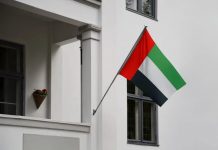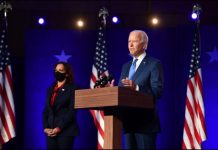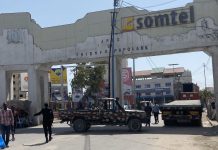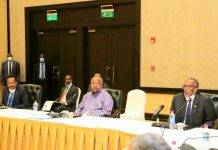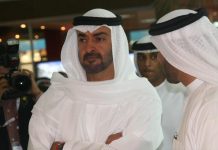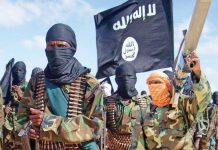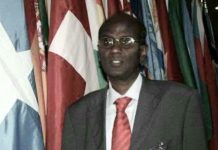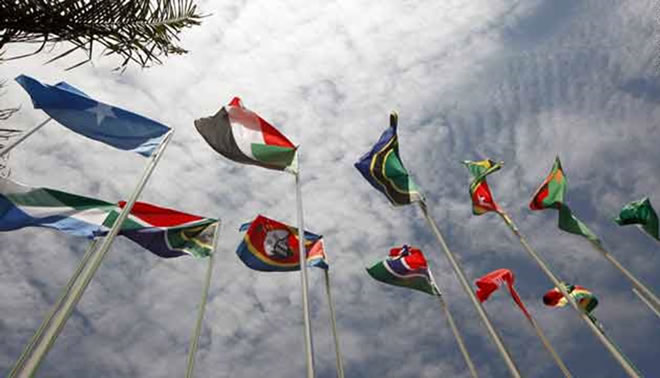For politics and international relations, the foreign policy of a country is an essential and indispensable aspect. In today’s perilous and highly complicated world, foreign policies are crucial for independent state classification amongst countries. It’s an obvious truth that in the growing interdependence of the existing international system, international relations between states are essential. Every state has their own interests and aims, for which a platform is provided by the international system. It is well-known that itis inconceivable to theorise foreign policy beyond the surroundings of national interest. Due to this, a nation creates foreign policy based on the context that is provided by national interest.
States purposefully create a foreign policy, which is comprised of policy and plans that dictate their international actions, in order to see their interests and aims realised. The conception of foreign policy is normally based on a state’s interests that are formulated in a way that can be achieved via international relations. Somalia, as a state interacting within the international system, creates interests and aims that it hopes to see achieved, based on its international and domestic requirements. Whilst there are positives to diplomacy in Somalia, it’s still commonly thought that the state is operating at a lower level than it’s capable of. This paper is centred on an examination of the challenges that Somalia has faced which has led to the performance of the state’s foreign policy being weakened.
Foreign Policy in Somalia: The Challenges
A. Professionalism
The early stages of creating and executing the foreign policy institutional framework come with many challenges, especially when this concerns the role that the Ministry of Foreign Affairs (MOFA). Funding, training, and finding staff are all factors that challenge the professionalism of Somali foreign policy, weakening its output. The website of the MoFA contain incorrect information and names of former government officials, including the former president Hassan Sheikh Mohamud are written as incumbent employees. This is a reflection of the wider picture, poor management and lack of capacity.
Professional deficiency is also a significant challenge, particularly as diplomacy is one of the noblest professions, where a full understanding of affairs and a well-established background of intellect are required, amongst other things. There is evidence to suggest that foreign policy practitioners and diplomats in Somalia have not been given training and guidance, leaving them unable to face the ongoing challenges of diplomacy in today’s world.
The MoFA budget allocation from the Federal Government for recurrent expenditure is comparatively low considering the service that is expected. This is considerably lower than the allocations given to other ministries, such as defence. Reports from abroad suggest that the ministry has encountered trouble, as it has missed payments to diplomats and been unable to pay the rent. In response to this, Somali missions overseas have not been looked upon favourably, with some political stakeholders and foreign policy analysts asking for the missions to be closed and underfunding has led to the closure of some embassies.
Two further challenges that are currently being faced by the MoFA staff are incompetence and corruption. Problems with mismanagement and corruption allegations have led to the recall of top Somali ambassador to Sudan. On a separate case the country’s Deputy Minister for Foreign Affairs Mukhtar Mahad Daud was suspended and arrested over allegations of fraud and abuse of office. Despite the arrests, no one has been charged.
The quality and professionalism of foreign affairs have undoubtedly suffered at the hands of high political involvement in Foreign Ministry recruitment. Moving forward, it is vital that professionals who have a considerable understanding of today’s international system become the driving force behind foreign policy in Somalia. Overall, two of the biggest general challenges that foreign policy and the Foreign Service in Somalia are up against are the establishment of professionalism and efficiency. Professionalism is further at risk due to the large number of posts that are currently held by non-careerist diplomats. The appointment of career-leading Foreign Service Officers who can champion Somali foreign policy overseas would help to improve professionalism and enhance the integrity of the Foreign Service. Creating more spaces in the Foreign Service for careerist diplomats might also help to fix the dwindling morale of senior officers. Productivity and loyalty can suffer significantly when there is frustration at the highest level of an organisation. The source of frustration amongst the officers of the MoFA is a lack of opportunity for careerist diplomats to obtain ambassador positions. With the exception of English, very few Foreign Ministry personnel are able to speak another foreign language. Due to the importance of fast communication, negotiation, and the establishment of vital trade deals, more language specialists and specialists in other disciplines have to be involved in the service, as opposed to generalists.
B. Foreign Policy: Involvement of Citizens and Public Opinion
There is no dispute over the essential inclusion and central position of public opinion in the creation of foreign policy. In an ideal world, public input would impact the establishment of foreign policy. In democratic states, there’s a belief that public opinion improves the process of creating foreign policy. Evidence suggests that this has not been the case in Somalia since 1960 when the state became independent. The evidence points towards personalistic decision making in Somalia, where foreign policy has been determined, without interference by the political elite. Public attempts to gain influence over the creation of foreign policy and the government’s stance have been present in Somalia, but they have ultimately failed. In practice, those responsible for decisions have, in the past, created policies that are very exclusive and heavily reliant on input from the ‘inner circle’. In a much broader sense, group pressure has not greatly influenced policy. This presents the challenge of an ineffective international foreign policy that is not domestic oriented.
C. Clarifying National Interest
At the centre of foreign policy sits national interest. The creation of foreign policy revolves around pushing national interest forward and protecting it, and as such, it cannot be created without outside influence; serving national interest should be the aim of foreign policy. It is therefore concerning that the national interest has not been given a clear or comprehensive definition by either the foreign policy practices of Somalia or its constitution. There has been no clear agreement amongst Somali leaders and analysts on what the national interest should consist of. If the country is unable to give a definition of what its national interests are, it will be harder to create a foreign policy that reflects the aims of Somalia and will enable the country to see its objectives achieved. The challenge is even greater given the appearance of new, strong actors and increasing globalization. In every respect, this is one of the most essential challenges that Somalia is facing in the modern world.
It is often the case in Somalia that the declared interests of the nation are not nationalistic. The absence of nationalistic qualities raises questions about how central the people of Somalia are to the determined national interests, while the absence of nationalism in the interests raises questions about how much public opinion influences what has been viewed as a collective benefit.
An absence of tradition and primordialism is a similar challenge to the creation and practice of foreign policy. The progress of foreign policy in Somalia has faced the enormous challenge of continued personalisation by each new head of state. The personalised approach to foreign policy creation, where foreign policy processes and patterns regularly change with the new leadership, has left Somalia without a traditional approach. This raises doubts over whether Somalia has a foreign policy that is distinctive to the nation.
D. Economy
The protection that is afforded to the national interest by foreign policy and the ability of this policy to be shared effectively on an international stage has been hindered by the poor state of the Somali economy. It is an obvious truth that the health of a nation’s economy determines the core of a nation’s international influence and standing. Somali’s poor economic development is hindering the country true ability to achieve prosperity. It faces many challenges, including a dependency on primary goods exportation and the importation of goods ready for distribution, which are very neo-colonial, and importantly, the country’s debt. These influences on the economy mean that achieving a bigger international role within the system is out of reach for Somalia.
Globalisation is a further challenge at play when the impact of economic challenges on Somali foreign policy are considered. Technological changes, particularly improvements to ICT, have led to globalisation, where there are less global restrictions and the globe has been homogenised to a higher degree. It is quicker and easier to share information today, as well as more affordable, and improvements to trade are increasing the quality and type of goods that consumers can access around the world. Despite the fact that globalisation has furthered trade and made more goods accessible to more people, it has also led to nation states becoming more protective. As a result, they tax imports to defend themselves against foreign competition. Every country is dependent on another to some degree, and the Information Age has led to the ready mobilisation of goods, capital, finance, and labour, making the world feel smaller. The interdependence this has created doesn’t benefit all countries to the same degree. There are many developing countries that, in a similar way to Somalia, do not enjoy as extensively the same trade balance and improved economies, along with the power that comes with it. The vulnerability this creates for Somalia and other countries in the same position could lead to them being more easily manipulated by countries that have seen greater benefit from globalisation.
Terrorism poses another challenge to foreign policy in Somalia. Coercion is monopolised by states in international relations. In any situation where state coercive force is contended by government groups, it creates a scenario of order and counter order, and the state then becomes defined by disorderly behaviour. Instances of Al-Shabaab terrorism is an obvious example of the challenge of terrorism in Somalia. Terrorism can weaken a government’s international image, raising concerns over internal security and the country’s ability to maintain it. An economic repercussion of this is reduced tourism and a lack of investment, which prevents the country from reaping the economic rewards of better productivity, foreign investment, and improved trade opportunities.
A Case Note on Foreign Policy Meltdown: Persona Non Grata
When Nicholas Haysom – United Nations Secretary-General António Guterres’s Special Representative and the most senior U.N. official in Somalia – raised questions over the detention of the former leader of Al-Shabaab, who was contesting a regional election, the Somali government took dire measures and expelled him. He was made to leave Somalia, despite only being in the position for a short amount of time, after he was declared persona non grata by the Foreign Ministry. The media owned by the state published a statement from the MoFA that said the decision to expel him was due to a violation of the norms of international diplomacy, intervention in Somalia’s national sovereignty and a violation of agency standards.
This event occurred in the middle of an existing crisis between Somalia’s Federal Government in Mogadishu, the country’s capital, and the Regional Member States. Regional governments were in the midst of elections, with Mukhtar Robow predicted to win the South West regional election. Up until 2017, Robow was Al-Shabaab’s deputy leader. With the intention of removing Sharif Hassan Sheikh Aden as president of the South West, Robow was encouraged to run for the position by the Federal Government in late 2017.
The Federal Government gave Robow their full support to run against Sharif Hassan, who was going to run again for the presidency. Sharif Hassan had previously critiqued the Federal Government but resigned after learning of the meddling. It was thought that Robow was the preferred candidate for the position, but after Sharif Hassan resigned, his campaign was stopped by the Federal Government; outwardly it was made to appear that this was due to Robow not formally rejecting Al-Shabaab. Shortly before the election, the Ethiopian army arrested Robow. There was widespread rioting, which caused 15 deaths and numerous arrests in Baidoa, the capital of the region, in the aftermath of this. Afterwards, Robow was moved to Mogadishu and held in a prison that was operated by the intelligence service.
In 2013, the UN Security Council Resolution 2102 created The United Nations Assistance Mission in Somalia (UNSOM) mandate. This mandate contains advice on a number of areas for state-building and peacebuilding policies, and was designed for the African Union Mission in Somalia (AMISOM) and the Federal Government. The areas include: federal system development and state formation, governance, international donor support coordination, constitutional review, rule of law and the combatant disengagement, reform of the security sector, and democratisation with 2016 political transition preparations. Haysom, as part of the duty of his position, questioned whether it was legal that Robow had been held for more than 48 hours and criticised the Federal Government’s actions in a letter. Prompts for an investigation into the civilian deaths that resulted from the rioting were also included within the letter. The letter further explained that the riots led to the arrest of in excess of 300 people in Baidoa, including minors. Haysom’s expulsion from Somalia has raised multiple questions that are currently unanswered.
Is there any justification for UN staff being declared persona non grata?
Article 9 of the Vienna Convention on Diplomatic Relations (VCDR) describes the persona non grata doctrine. There is the premise that personnel exchange is either the acceptance of a notification of appointment or an agreement made between the sending state and the receiving state for personnel under a number of predetermined categories. The state receiving the personnel doesn’t need to provide an explanation for refusing a diplomat and can declare the diplomat a persona non grata, forcing them to exit the state, in accordance with VCDR.
The persona non grata doctrine does not apply to UN officials, as per the long-term declaration of the UN. Authority for the appointment of UN staff belongs to the UN Secretary-General, in accordance with the UN Charter, article 101. Also, in accordance with the UN Charter, paragraph 2 of article 100states that the responsibilities of the exclusive international character held by staff and the UN Secretary-General must be respected by members. UN officials do not represent any government and they are not recognised between governments, unlike government diplomats. Personnel from the UN are employed as per the agreement between multiple states.
In 1964, the UN Office for Legal Affairs explained that the persona non grata principle applies only to recognised diplomats, not to UN staff that are unrecognised and act as impartial and independent officers, which the UN are responsible for. The same applies to officials that have immunities and certain privileges that a diplomat would receive, either due to bilateral agreements, or as per article 9, section 19 of the General Convention. The logic particularly applies when the position of experts are considered who are working on behalf of the UN and UN officials that are civil servants working internationally and not acting on behalf of states. A number of problems regarding the creation and execution of Somali foreign policy have been exposed by this case note, and present many doubts, both domestically and internationally, over the ability of the country’s foreign policy.
The Future of Somali Foreign Policy
This paper has sought to provide an examination and discussion of the varied challenges that are facing foreign policy in Somalia. From the information provided, it’s not untrue to state that foreign policy in Somalia has not reached its potential, due to the considerable number and complexity of challenges it has encountered over the course of many years. Its poor position in the developing continental and global order is an implication of Somalia’s challenging development. Due to the emerging challenges of globalisation and the growing need to focus on results and be efficient, foreign policy in Somalia needs an immediate review. There’s an exceptional requirement that Somalia should implement a strong economic policy so that they can better develop and execute foreign policy in the future. To sustain a viable foreign policy, the dependency structure of the Somali economy needs to be eliminated to make way for a new economic base, as the basis of all foreign policies is the state’s economy. In a political sense, it’s much more logical for Somalia to create a foreign policy that is not based on a fictional economy, but on its existing status. Economic determinism should be the focus of foreign policy aims so that it can address the poor social infrastructure, debt, and crisis situation in Somalia. There’s no logic in the country continuing to use the same diplomacy whilst still relying on loans from foreign countries.
There’s an immediate need to rid the foreign policy in Somalia of personalisation. Although the ideas of the leaders should not be dismissed, it’s imperative that these ideas are subjected to the state’s decision-making process. The process of foreign policy formation needs to be democratic for this to be achieved. Democratisation would allow institutions, which are currently given the authority to participate, the ability to perform their statutory duties and ensure public participation in the foreign policy creation process.
To improve its service, the MoFA must receive suitable direction and be given the funding and staff that it needs. It’s also essential that the ministry is given the freedom to progress without the problem of outside influences taking authority and then failing to claim responsibility when their decisions lead to a lack of progress. For the MoFA to be successful, it should have control over the creation of Somali foreign policy and hold full responsibility for the success or failure of the policy. Currently, the morale of many Foreign Service is low and they are frustrated at their inability to progress to ambassadors due to the significant involvement of non-career ambassadors within the practices of Somali foreign policy. Due to this, the Foreign Service in Somalia doesn’t benefit from the experience and knowledge of career diplomats who have training. Finally, in light of the recent persona non grata problems, the formulation of Somalia’s foreign policy needs to be examined, with monitoring introduced and the provision of a thorough explanation.
Mohamed Omar Hashi was a Member of the Transitional Federal Parliament of Somalia from 2009 to 2012, and holds an M.A. in International Security Studies from the University Of Leicester. He can be reached via Email: mohamedhashi74@gmail.com









